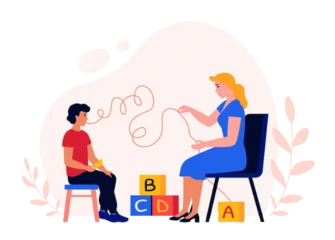
Pursuing a Diploma in Child Psychology
In a world where mental health awareness is on the rise, understanding the psychological development of children has never been more crucial. Pursuing a Diploma in Child Psychology offers a profound opportunity to delve into the intricate workings of young minds, equipping individuals with the tools and knowledge to support, guide, and nurture the next generation. Whether you’re an aspiring educator, counselor, or someone passionate about child development, this diploma can be a transformative stepping stone in your career.
A Diploma in Child Psychology provides a comprehensive foundation in understanding how children grow, think, and behave from infancy through adolescence. Unlike a general psychology program, this specialized diploma focuses solely on child development, addressing crucial aspects such as emotional regulation, cognitive growth, social interaction, and behavioral challenges.
Key Benefits:
- Specialized Knowledge: Gain in-depth insights into child-specific psychological theories and practices.
- Career Opportunities: Open doors to roles in education, healthcare, social work, and counseling.
- Practical Skills: Learn practical techniques for working with children, understanding their needs, and addressing developmental challenges.
A well-structured child psychology diploma covers various essential subjects, ensuring students are well-equipped to handle real-world scenarios. Here’s a snapshot of what you can expect to learn:
- Developmental Stages: Explore the key milestones in physical, cognitive, and emotional development from birth to adolescence.
- Behavioral Psychology: Understand the factors influencing child behavior and effective behavioral intervention strategies.
- Child Mental Health: Dive into common psychological issues affecting children, such as anxiety, depression, ADHD, and autism spectrum disorders.
- Counseling Techniques: Develop skills in child-centered counseling approaches, including play therapy and cognitive-behavioral techniques.
- Family Dynamics: Learn how family relationships impact a child’s psychological development and ways to support healthy family environments.
This diploma is ideal for:
- Aspiring Child Psychologists: Those planning to pursue advanced degrees and careers in child psychology.
- Educators: Teachers and childcare providers who want to better understand their students’ psychological needs.
- Social Workers: Professionals working with children in foster care or at-risk environments.
- Parents and Caregivers: Individuals looking to deepen their understanding of child behavior and development.
Career Prospects and Opportunities
A Diploma in Child Psychology can lead to diverse career paths, including:
- Child Counselor: Providing emotional and psychological support to children in schools, clinics, or private practice.
- Educational Psychologist Assistant: Supporting educational psychologists in assessing and addressing learning difficulties.
- Childcare Specialist: Working in daycares, preschools, or after-school programs to foster healthy development.
- Social Services Worker: Assisting in child welfare cases and supporting children in foster care or adoption processes.
Further Education: Many diploma graduates choose to continue their education with a bachelor’s or master’s degree in psychology, education, or social work, further expanding their career opportunities.
Most diploma programs combine theoretical coursework with practical experience. You’ll engage in interactive lectures, case studies, role-playing exercises, and possibly internships or practicums. Many programs also offer online options, making it accessible for working professionals or those with other commitments.
Practical Skills Developed:
- Active listening and communication techniques
- Observational skills for assessing child behavior
- Designing and implementing intervention plans
- Collaborating with families and other professionals
Emotional Intensity: Working with children, especially those facing challenges, can be emotionally demanding. Developing self-care routines and seeking peer support are crucial.
Staying Updated: Child psychology is an evolving field. Continuing education and staying informed about new research and methodologies are essential for long-term success.
Balancing Theory and Practice: Applying theoretical knowledge to real-world situations can be challenging. Hands-on experience and internships bridge this gap effectively.
FAQs: Pursuing a Diploma in Child Psychology
- What are the prerequisites for enrolling in a child psychology diploma program?
Most programs require a high school diploma or equivalent. Some may prefer candidates with prior experience in education or childcare.
2. How long does it take to complete the diploma?
Typically, the program lasts 12 to 18 months, depending on whether you study full-time or part-time.
3. Can I pursue this diploma online?
Yes, many institutions offer online programs, providing flexibility for working professionals or those with other commitments.
4. What skills will I gain from this diploma?
You’ll develop skills in child assessment, behavioral intervention, counseling techniques, and understanding developmental psychology.
5. Is this diploma recognized for employment?
Accredited programs are widely recognized by employers in education, healthcare, and social services. Ensure the program you choose is accredited by a reputable body.
6. What’s the difference between this diploma and a degree in psychology?
A diploma focuses specifically on child psychology and offers a shorter, more targeted learning experience. A degree covers broader psychological theories and requires a longer commitment.
7. What are the career prospects after completing this diploma?
Graduates can work in various settings, including schools, healthcare facilities, social services, and private practice, or continue their education for advanced roles.
8. Will this diploma qualify me to open my own practice?
While it provides a strong foundation, additional qualifications (such as a bachelor’s or master’s degree) and licensure are usually required to practice independently.
9. How can I ensure success in the program?
Stay organized, engage actively in practical exercises, seek mentorship, and continuously reflect on your learning experiences.
10. Is there financial aid available for these programs?
Many institutions offer scholarships, grants, or payment plans. Check with the program’s financial aid office for specific options.
Final Thoughts: Shaping the Future, One Mind at a Time
Pursuing a Diploma in Child Psychology isn’t just about acquiring knowledge—it’s about developing the empathy and skills necessary to positively impact young lives. Understanding the complexities of childhood development equips you to support children through challenges, foster their growth, and contribute meaningfully to society.
Whether you’re embarking on a new career path or enhancing your current role, this diploma is more than an academic achievement; it’s a journey into the heart of what it means to nurture the next generation.

